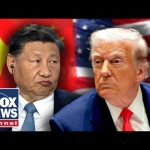President Donald Trump is back in the headlines with bold action against the growing threat of narco-terrorism. In a video posted to his Truth Social account, Trump showcased a U.S. operation that intercepted and disabled a drug-smuggling boat allegedly carrying narcotics bound for American shores. Trump declared that intelligence confirmed the vessel’s mission was to “poison Americans,” and the operation was presented as a direct strike at those who profit from chaos and addiction. For millions of families devastated by the drug crisis, this kind of decisive action resonates as a real plan to defend the nation rather than more empty political rhetoric.
Beyond stopping one boat, Trump is targeting the broader network fueling the drug epidemic. At the center of his strategy is Venezuelan dictator Nicolás Maduro, a strongman long accused of partnering with cartels to enrich his regime while destabilizing the region. Trump’s message is clear: America isn’t just fighting smugglers, it’s fighting organized narco-terrorists who operate like shadow armies. By tightening sanctions and further isolating Maduro, Trump aims to undercut the infrastructure that allows drugs to pour into U.S. communities. Critics may complain about tough sanctions, but weakening Maduro strikes at a dictator whose reach has harmed countless lives across the hemisphere.
Mexico is another focal point in Trump’s offensive. While his previous administration worked on border security and pressured Mexico to curb illegal immigration, this new push sends an even sterner warning. Trump has made it plain that Mexico must partner with the U.S. in dismantling these cartels, or it could face financial consequences such as higher tariffs. This is vintage Trump—leveraging American economic strength to force cooperation on security issues. Those who accuse him of being too combative miss the point: the lives of American citizens are more important than sparing the feelings of foreign governments that tolerate or enable cartels.
Senator Marco Rubio, a longtime critic of Maduro and a leading voice on Latin American policy, has echoed Trump’s approach and urged further vigilance. Rubio understands that breaking the drug pipeline at its source could be one of the greatest foreign policy victories of our time. While Washington elites often waste resources on faraway conflicts, securing our own hemisphere and protecting our borders should be the top priority. Americans suffering the real-world effects of fentanyl and cartel violence care far more about what comes across the Rio Grande than what happens in far-flung capitals overseas.
This renewed fight against narco-terrorism puts America back on offense. Rather than passively reacting to overdoses and cartel violence, Trump’s strategy takes the fight directly to the criminals and the regimes that enable them. It’s a reminder that keeping Americans safe requires more than nice speeches—it requires the will to use force, apply pressure, and demand accountability from foreign governments. If this effort succeeds, it won’t only reduce the flow of deadly drugs into the U.S., but it could also shift foreign policy by proving that America, under strong leadership, can protect its citizens first.




